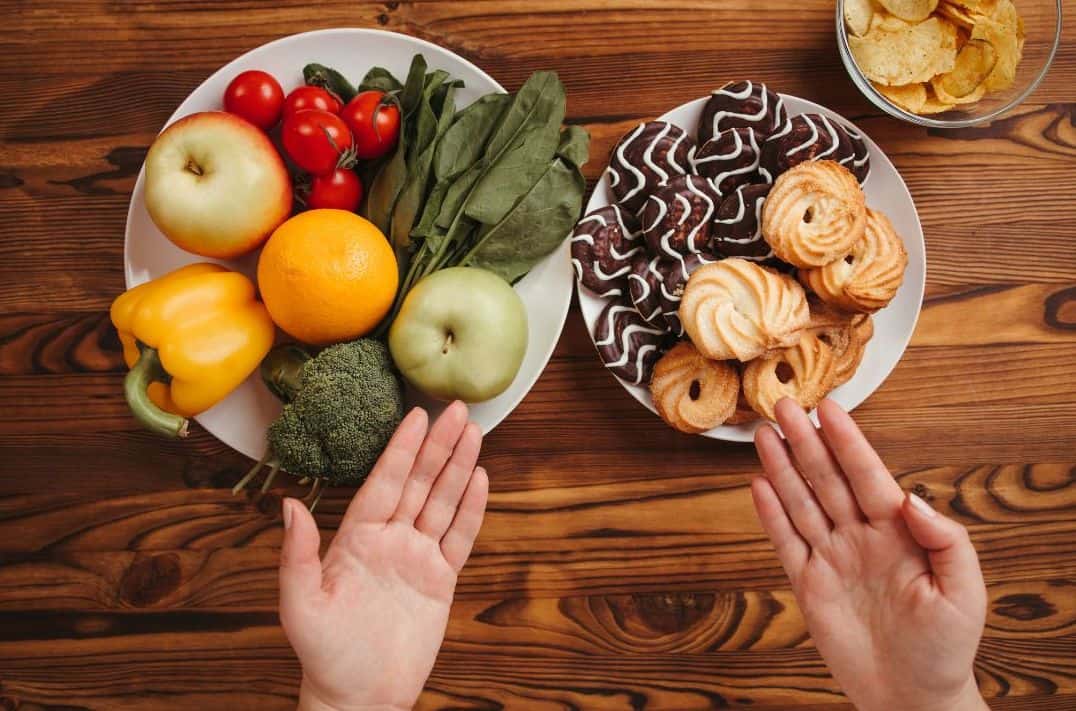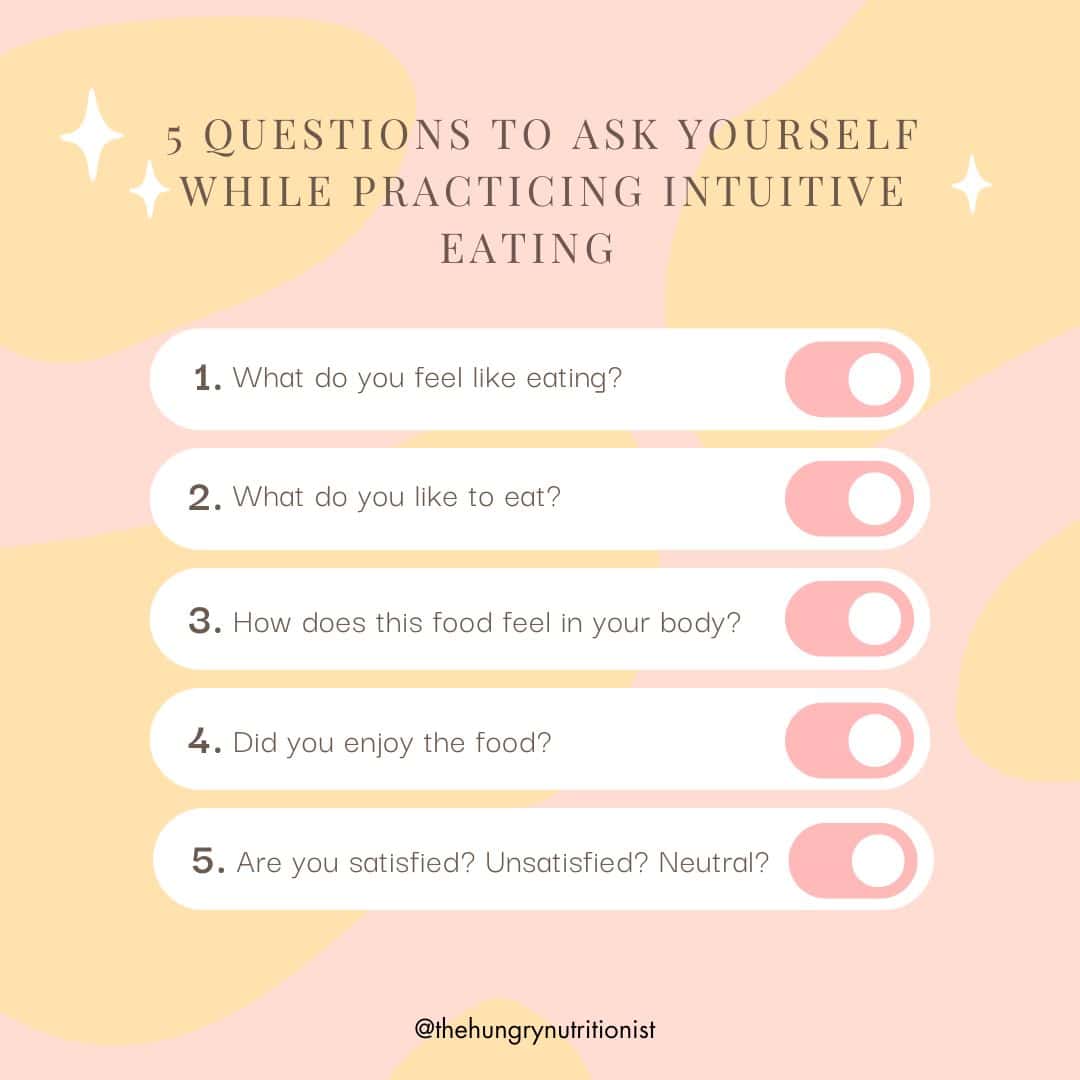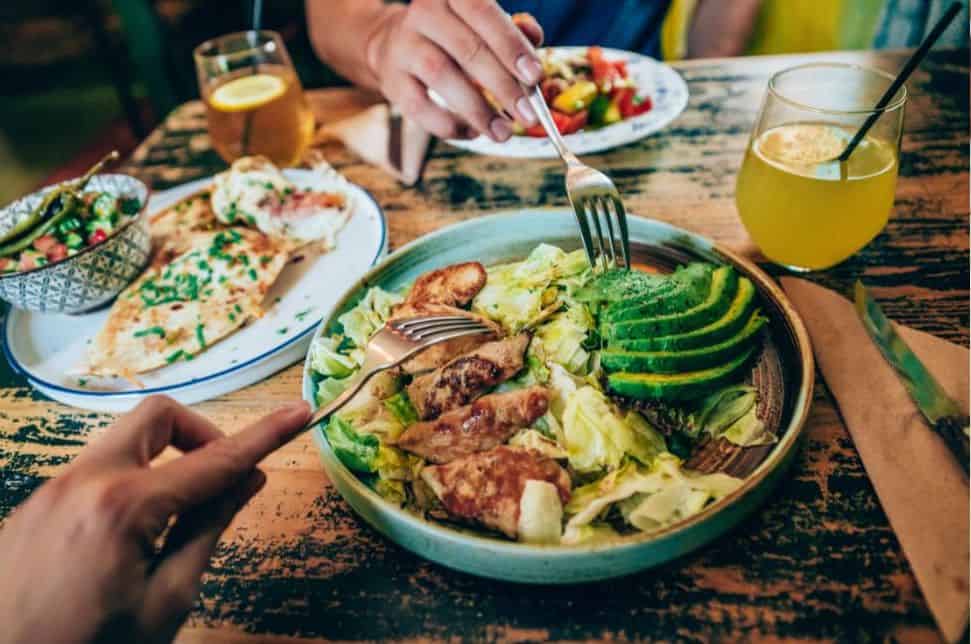Last Updated on: 8th August 2024, 06:29 pm
This article was written by Associate Registered Nutritionist (ANutr) Cherie Ko, and reviewed by Registered Dietitian, Sarah Idakwo
Table of Contents
Intuitive eating is a transformative approach to break free from the endless cycle of dieting. By learning to eat and without guilt, you can heal your relationship with food and body, and become more attuned to your internal body cues. If you’re considering starting intuitive eating, this guide will provide you with everything you need to know to begin your journey.
What is Intuitive Eating?

Intuitive eating is a non-dieting approach that focuses on 10 principles, it emphasises eating with attunement. It shifts the focus aware from dieting to look a certain way to emotional well-being, holistic healing, building a positive relationship with self whilst promoting body acceptance (1). While these principles are straightforward, tuning into your internal signals can be challenging, especially if you’ve spent years ignoring your body’s cues and adhering to diet rules.
Many of us have been introduced to diet rules from a young age, such as categorising food into ‘good’ or ‘bad,’ sticking to strict meal times, eating when we’re not hungry, and pushing food away when we’re still hungry. These habits disconnect us from our internal cues, leading us to rely on external signals about what, how much, and when to eat.
Core principles of Intuitive Eating
Intuitive eating is built on 10 principles designed to improve your relationship with food and your body, and guide you in practising intuitive eating (2):
- Reject the Diet Mentality
- Honour Your Hunger
- Make Peace with Food
- Challenge the Food Police
- Respect Your Fullness
- Discover the Satisfaction Factor
- Honour Your Feelings Without Using Food
- Respect Your Body
- Exercise to Feel the Difference
- Honour Your Health with Gentle Nutrition
What are the benefits of Intuitive Eating?
Intuitive eating offers numerous benefits over traditional restrictive dieting. Research consistently demonstrates that intuitive eating can lead to positive nutritional outcomes and sustainable health improvements.

Improved Physical Health Outcomes
Long-term studies of restrictive diets have shown concerning results: not only do one-third of dieters regain more weight than they initially lose, but repeated dieting attempts can also negatively impact physical health. In stark contrast, intuitive eating promotes weight stability and improved overall health without focusing on calorie restriction or food avoidance (3,4).
Enhanced Psychological and Emotional Well-being
Intuitive eating is also associated with significant psychological benefits. Studies indicate that individuals who practise intuitive eating report fewer instances of disordered eating, improved body image, and greater emotional well-being. This approach encourages a healthy attitude toward food and body image by focusing on both internal and external cues of hunger and fullness with body attunement rather than solely relying on external dietary rules or restrictions (5,6).
A Weight-Neutral Approach
One of the fundamental principles of intuitive eating is about respecting the body. By prioritising the body’s internal signals over external weight control efforts, intuitive eating shifts the focus from weight-centric goals, which can perpetuate disordered eating, to an inclusive, health-focused approach. This shift is critical in building a healthy and sustainable relationship with food and body image, making it an ideal practice for individuals looking to move away from the harmful cycles of dieting (7,8).
Intuitive Eating and Trauma
Considerable research confirms that traumatic experiences, particularly those involving PTSD and other related comorbidities, are strongly linked to the development of eating disorders. Studies reveal that individuals with a history of emotional, physical, or sexual abuse in childhood are significantly more likely to develop eating disorders in adulthood (9, 10).
For many, food becomes a source of control in a world that feels chaotic and unpredictable. Dieting, restrictive eating, and binge eating are often employed as coping mechanisms to manage the overwhelming emotions tied to traumatic memories. This approach to food, while temporarily comforting, often perpetuates a cycle of guilt and distress.

Moreover, the concept of generational dieting trauma opens up further discussion. The behaviours and beliefs about food passed down from one generation to the next can profoundly impact one’s self-image and eating habits. This cycle often manifests as guilt or shame associated with eating certain foods, or the perceived need to ‘earn’ food, which only serves to deepen the trauma around eating (11)
A 2022 study similarly sheds light on how a mother’s eating habits can influence children’s attitudes towards food from as young as toddler age, potentially setting the stage for a lifelong struggle with body image and the pursuit of thinness (12).
Intuitive eating offers a transformative path forward. By focusing on tuning into our body’s needs we can foster a healing relationship with food and our bodies. It encourages us to recognise and honour cues like hunger and fullness with attunement whilst also exploring what these cues are. For example there is physical hunger, there is taste hunger, emotional hunger and practical hunger. Exploring these cues allows for a shift away from unhealthy, restrictive eating patterns.
Intuitive Eating in Eating Disorder Recovery
Intuitive eating isn’t typically the first line of treatment in eating disorder recovery. Early recovery often requires a structured meal plan to renourish the body and normalise eating patterns, as hunger and fullness cues can be out of sync with the body’s energy needs.
However, aspects of intuitive eating, such as rejecting diet rules, relearning eating cues, and managing emotions in relation to food, are crucial for recovery. Studies have shown positive long term impact, including improved psychological health, reduced disordered eating behaviours, particularly binge eating, and enhancing overall well-being (13, 14).
Similar to trauma, intuitive eating can help you focus more on flexibility, acceptance and balance, as compared to perfectionism and strict adherence to food rules as we see in eating disorder symptoms. Integrating elements of intuitive eating into your recovery journey could help build a healthier relationship with food.
Intuitive Eating and Emotions
Physical VS Emotional hunger
A key step in intuitive eating is recognising the difference between physical and emotional hunger:
| Emotional Hunger | Physical Hunger |
| Comes on suddenly | Builds gradually |
| Craves specific foods | Satisfied by various foods |
| Leads to eating for comfort | Satisfied by eating to meet energy needs |
It is entirely normal to eat in response to thoughts and feelings from time to time. It’s important to acknowledge emotional eating and why we use it to deal with or respond to difficult feelings and emotions.
Emotional eating only becomes a major issue when it is a routine or something that causes you emotional distress. However, by being able to attune to your emotions and better distinguish between emotional and physical hunger, you would start to form a better relationship with food
Mindfulness and Intuitive Eating
Focusing on mindfulness in intuitive eating helps you become more present while eating, make peace with your food, and become aware of hunger and satiety cues. However, its important to note that intuitive eating and mindfulness are not the same thing. You can eat mindfully without becoming an Intuitive eater and vice versa.
To incorporate mindfulness into intuitive eating, consider these five questions during and after meals:
- What do you feel like eating?
- What do you enjoy eating?
- How does this food feel like in your body?
- Did you enjoy the food?
- Are you satisfied, unsatisfied, or neutral?

Challenges with Intuitive Eating
It is normal to experience ‘setbacks’ during your journey of intuitive eating. We’ve been conditioned for a long time to think about food, diet, and eating in a certain way. Breaking this cycle can be challenging!
Common challenges and misconceptions about intuitive eating include:
- Fear of Uncontrolled Eating: Many worry that letting go of diet rules will lead to uncontrolled eating and constant cravings for unhealthy foods. However, intuitive eating teaches you to trust your body and find a balance, allowing you to enjoy all types of foods in moderation over time.
- Difficulty Tuning into Internal Cues: After years of dieting and restricting, recognizing hunger and fullness signals can be tough. Relearning to listen to your body’s natural cues requires patience and practice, but it is an essential part of the intuitive eating journey.
- Misconception of Eating Only Junk Food: Intuitive eating does not mean eating junk food and snacks uncontrollably. It focuses on listening to your body’s needs and honouring feelings of hunger and fullness. This approach helps you choose foods that satisfy both your nutritional needs and your cravings, without labelling foods as “good” or “bad.”
- Feeling Lost While Practising Intuitive Eating: Intuitive eating offers increased flexibility and fewer restrictions than traditional diets. For those used to strict regimes, this can initially feel disorienting. It’s important to embrace this flexibility and trust the process, knowing that it’s a part of reconnecting with your body’s natural signals.
- Maintaining health goals: While intuitive eating emphasises flexibility and encourages you to listen to your body’s needs, this doesn’t mean you have to abandon your health goals. Embracing intuitive eating allows you to pursue your goals in a way that feels balanced and aligned with your body’s natural signals, integrating health objectives without imposing unnecessary restrictions.
Remember, the journey to intuitive eating is about progress, not perfection as well as non-judgemental curiosity. Embrace the learning curve and be kind to yourself along the way.
How to deal with setbacks in the journey to Intuitive Eating

Embarking on the journey to intuitive eating is a transformative process, but it’s not without its challenges. Setbacks (or learning as I like to call it) are a natural part of this journey and can sometimes feel discouraging. However, understanding how to navigate these obstacles and understanding that there is no pass or fail in recovery, it’s all a learning journey, can make all the difference. Here are some strategies to help you manage setbacks and continue progressing towards a healthier relationship with food and your body:
- Seek Professional Support: Working with a registered dietitian or therapist specialising in intuitive eating can provide personalised guidance and support. They can help you navigate challenges and develop strategies tailored to your needs. It is important to ensure this professional has done training on IE.
- Practice Self-Compassion: Be kind to yourself during this journey. See ‘setbacks’ are learning opportunities rather than reasons to give up.
- Build a Support System: Surround yourself with supportive friends, family, or a community who understand and respect your intuitive eating goals. Their encouragement can help you stay motivated.
- Challenge Negative Thoughts: Actively challenge and reframe negative thoughts related to food and body image. Replace them with positive affirmations that reinforce your commitment to intuitive eating.
- Set Realistic Goals: Set small, achievable goals to build confidence and celebrate progress. Recognise that intuitive eating is a journey, not a destination, and that it’s okay to progress at your own pace.
- Focus on Long-term Benefits: Keep in mind the long-term benefits of intuitive eating, such as improved mental health, better body image, and a healthier relationship with food. Reminding yourself of these benefits can help you stay motivated during challenging times.
Conclusion
Remember, intuitive eating is about progress, not perfection. The ultimate goal of intuitive eating is not just to improve your relationship with food but to enhance your overall well-being. By tuning into your body and respecting its needs, you can achieve a balanced and fulfilling approach to eating that aligns with your health goals without the rigidity of traditional diets.
Ready to take the next step?
Say goodbye to the endless cycle of dieting by booking your FREE discovery call with me HERE to start your intuitive eating journey today.


